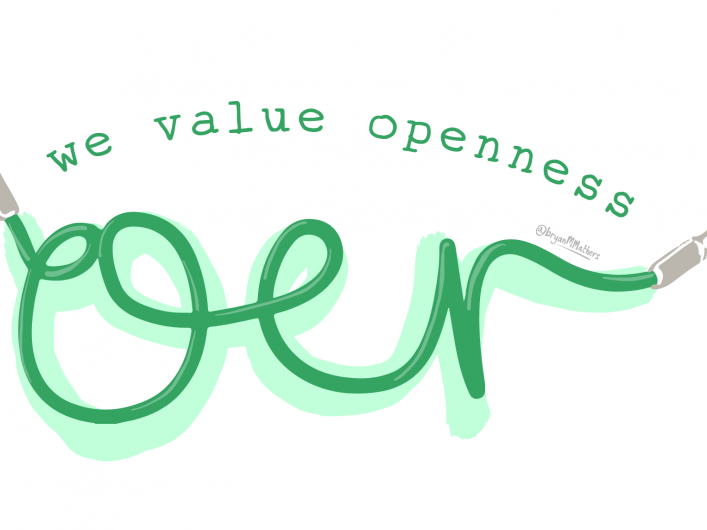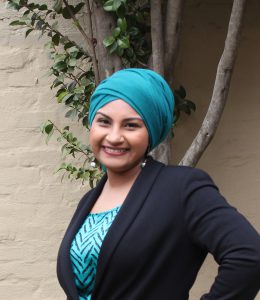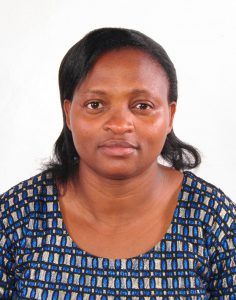
Meet the #OER19 keynote panel Taskeen Adam @Taskeeeners, Caroline Kuhn @carolak and Judith Pete @judyphalet
We’d like to enrich the programme with a different approach to plenary sessions, so alongside an inspiring individual keynote from Kate Bowles at UOW, we have invited three open education scholars to collaborate to create a keynote panel that will bring together different voices around the key themes of the conference:

Taskeen Adam (@Taskeeeners)
Taskeen Adam is a Cambridge-Africa scholar pursuing doctoral research at the University of Cambridge. She was voted one of M&G’s top 200 Young South Africans in 2014. Her PhD is on the role of African Massive Open Online Courses (MOOCs) in helping the marginalized, with a specific focus on digital neo-colonialism and epistemic violence. Her research helped her to pilot her start-up, Khwela, a regional online course platform responding to the needs of marginalised South African youth. Her journey to this topic started when she, as an engineer, founded Solar Powered Learning, with the idea that technology alone could improve education. Recognising this flawed logic led her to pursue her masters in the Sustainable Implementation of the One Laptop per Child project in Rwanda, alongside pioneering the Mobile Education for Smart Technology project in India, which both focused on the sociological rather than technical aspects of implementation. These projects served to highlight that historical injustices, cultural imposition, and economic dependence continue to play a pivotal role in education.
 Caroline Kuhn (@carolak)
Caroline Kuhn (@carolak)
I was born and raised in Venezuela where I have always been concerned with the profound and increasing social inequality I saw in different areas of society. This concern inspired me to pursue a career as a mathematics teacher, so I could engage with and support socially disadvantaged students in their journey into university. My Master’s thesis focused on cognitive tools to improve students’ mathematical knowledge. Political and ethical reasons brought me out of Venezuela and into Europe in 2011. Short research experiences at Complutense University (Madrid) and the Freudenthal Institute for Science and Mathematics Education (Utrecht University) led to my current PhD research at Bath Spa University. My thesis explores how, why and to what extent undergraduates engage/don’t engage with digital tools and platforms. I challenge deterministic assumptions such as young people being ‘digital natives’ by looking beyond the obvious to shed light on the complex and nuanced reality of students’ (open/closed) digital practices. I aim at uncovering the hidden mechanisms that more often than not constrain student’s agency, in particular, in their (open) academic practices. I believe educational technology use must be addressed in relation with the social setting students operate in so that the interplay between students’ agency and social structures can be explored, opening possibilities for social change. See Caroline’s site.

Judith Pete (@judyphalet)
Judith is a Kenyan and has been serving in academic and regional Non-Governmental Organizations in different managerial and leadership capacities since 2005. Judith has a Bachelor’s degree in Sustainable Human Development and a Master of Business Administration with Financial Management option, both from the Catholic University of Eastern Africa (Nairobi). She expects to graduate with her PhD in Management and Educational Technologies at The Open University in Netherlands. Her doctoral work assessed the differentiation in access to and the use and sharing of Open Educational Resources among students and lecturers at 12 universities in three countries in Africa. This research is a part of the large-scale intercontinental study Open Educational Resources for Development (ROER4D), which was undertaken to get a fair ‘OER picture’ for the Global South (covering South America, Southeast Asia, and Sub-Saharan Africa). This research received funding from Hewlett Foundation and International Development Research Center (IDRC), in collaboration with the UNESCO Chair on OER at The Open University Netherlands. Judith has published work in a number of peer-reviewed academic journals including International Review of Research in Open and Distributed Learning (IRRODL) and has passion for OEP and OER.
